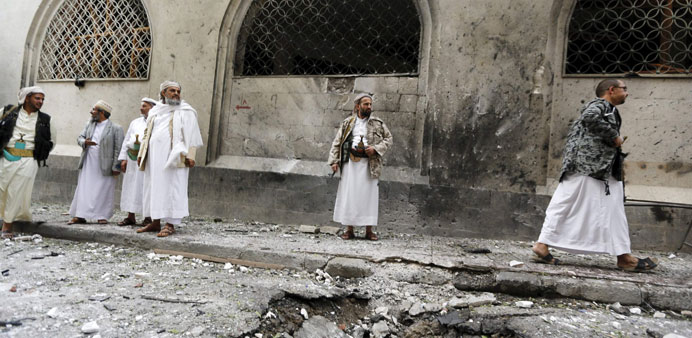People stand at the site of the car bomb attack in Sanaa yesterday.
Pro-government forces expand their area of control after recapturing the port of Aden, Yemen’s second city, after four months of fighting
AFP
Sanaa
A car bomb claimed by the Islamic State group exploded outside a Shia mosque in Yemen’s capital yesterday, killing four people, as loyalist fighters advanced on a rebel-held airbase in the south.
Witnesses said the blast was near a mosque of the Bohra sect of Shia Islam, not far from Ath-Thawra Hospital in the Rammah district of Sanaa, where several attacks claimed by IS have targeted Shia rebels who control the capital.
An IS Twitter user calling himself Karar al-Moayad said the militant group had carried out the attack and that it had left “several dead”, while a medical source said another four people were wounded.
Four people were also killed in a similar explosion on July 21, according to a toll provided by the Houthi insurgents, who control large parts of Yemen.
Bomb attacks by the IS targeted several Shia mosques in the capital on March 21 and killed 142 people.
Meanwhile, clashes raged in the south, where pro-government forces expanded their area of control after recapturing the port of Aden, Yemen’s second city, after four months of fighting.
The loyalists pushed back rebels in Lahoum, on Aden’s northern outskirts, following heavy fighting in which 12 rebels were killed, military sources said.
Three pro-Hadi fighters were killed and dozens wounded, medical sources said.
The area is on the road to Lahj, where loyalists have been tightening the noose on rebels, aiming to recapture the strategic Al Anad airbase.
The clashes and renewed anti-rebel air strikes yesterday by a Saudi-led Arab coalition highlighted the failure of a five-day truce declared from midnight Sunday by the coalition to allow the delivery of desperately needed relief supplies.
Four months of fighting has left 3,984 people dead, nearly half of them civilians, according to the United Nations.
On Tuesday, the UN aid chief urged the Security Council to step up efforts to secure a pause in fighting.
“This conflict has brought appalling damage on an already suffering people,” Stephen O’Brien said.
“We must redouble our efforts to secure a pause in the fighting which is adhered to by all parties, to reach all those in need with basic assistance, and urgently to give time and space to seek to reach a more durable ceasefire and a political solution.”
O’Brien said the much-needed aid response in Yemen was “woefully under-resourced”, with only $241mn received out of a $1.6bn UN appeal.
Aid agencies had developed a plan to reach 3mn people during the truce with vital aid, including water, sanitation, food and healthcare.
Eighty percent of Yemen’s population—an estimated 21mn people—are in need of aid and protection, and more than 10mn are struggling to obtain food and water, the UN says.
In other developments, the exiled Yemeni government has issued an order for militiamen fighting alongside loyalist troops against the rebels to be merged into the armed forces.
The country’s supreme defence council, which met in Riyadh on Tuesday, decided to “assimilate members of the Popular Resistance into the units of the armed forces and security forces”, the government-run news agency said.
The decision was to reward them for their “brave contribution to defending the homeland”.
Popular Resistance units were formed when the Iran-backed rebels and their allies advanced on southern regions after they had overrun the capital in September.

